Analysis of Governance and Business Ethics in Volkswagen Automotive
VerifiedAdded on 2022/10/01
|13
|3156
|25
Report
AI Summary
This report provides an in-depth analysis of the ethical and governance failures within Volkswagen, specifically focusing on the diesel emission scandal involving the use of defeat device software. The report begins with an overview of Volkswagen's history and operations, followed by a detailed case analysis of the emission scandal. It explores the ethical concerns related to the company's actions, including violations of environmental regulations and consumer rights. The report examines the application of ethical theories, such as Utilitarianism and Kantianism, to evaluate the company's decisions. Furthermore, it discusses the implications of the scandal on stakeholders, including consumers, the environment, and the company's reputation. Finally, the report concludes with a discussion of potential remedial plans and recommendations for Volkswagen to improve its corporate governance and ethical practices. The report highlights the importance of ethical decision-making in business and the consequences of prioritizing profit over ethical responsibilities.
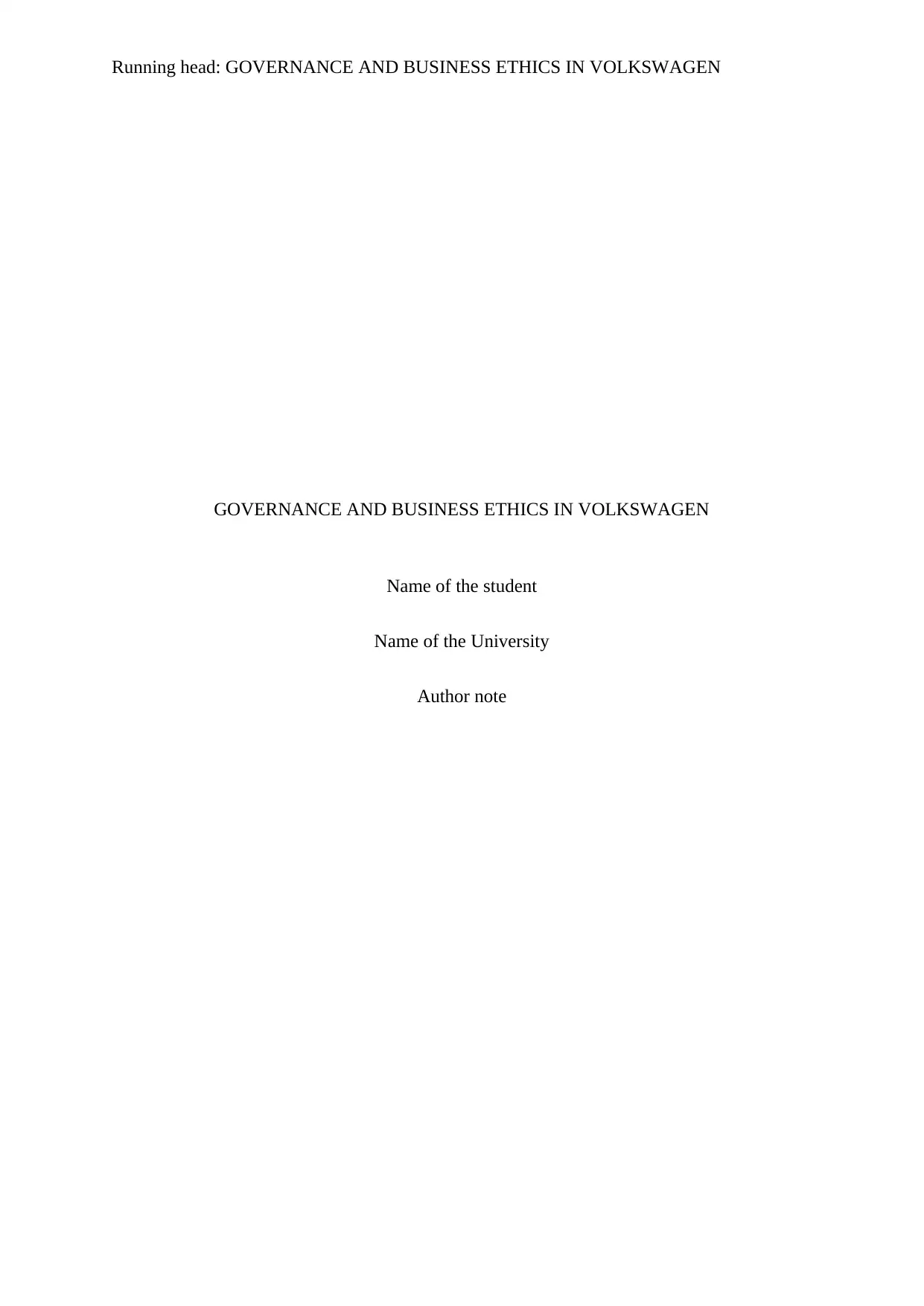
Running head: GOVERNANCE AND BUSINESS ETHICS IN VOLKSWAGEN
GOVERNANCE AND BUSINESS ETHICS IN VOLKSWAGEN
Name of the student
Name of the University
Author note
GOVERNANCE AND BUSINESS ETHICS IN VOLKSWAGEN
Name of the student
Name of the University
Author note
Paraphrase This Document
Need a fresh take? Get an instant paraphrase of this document with our AI Paraphraser
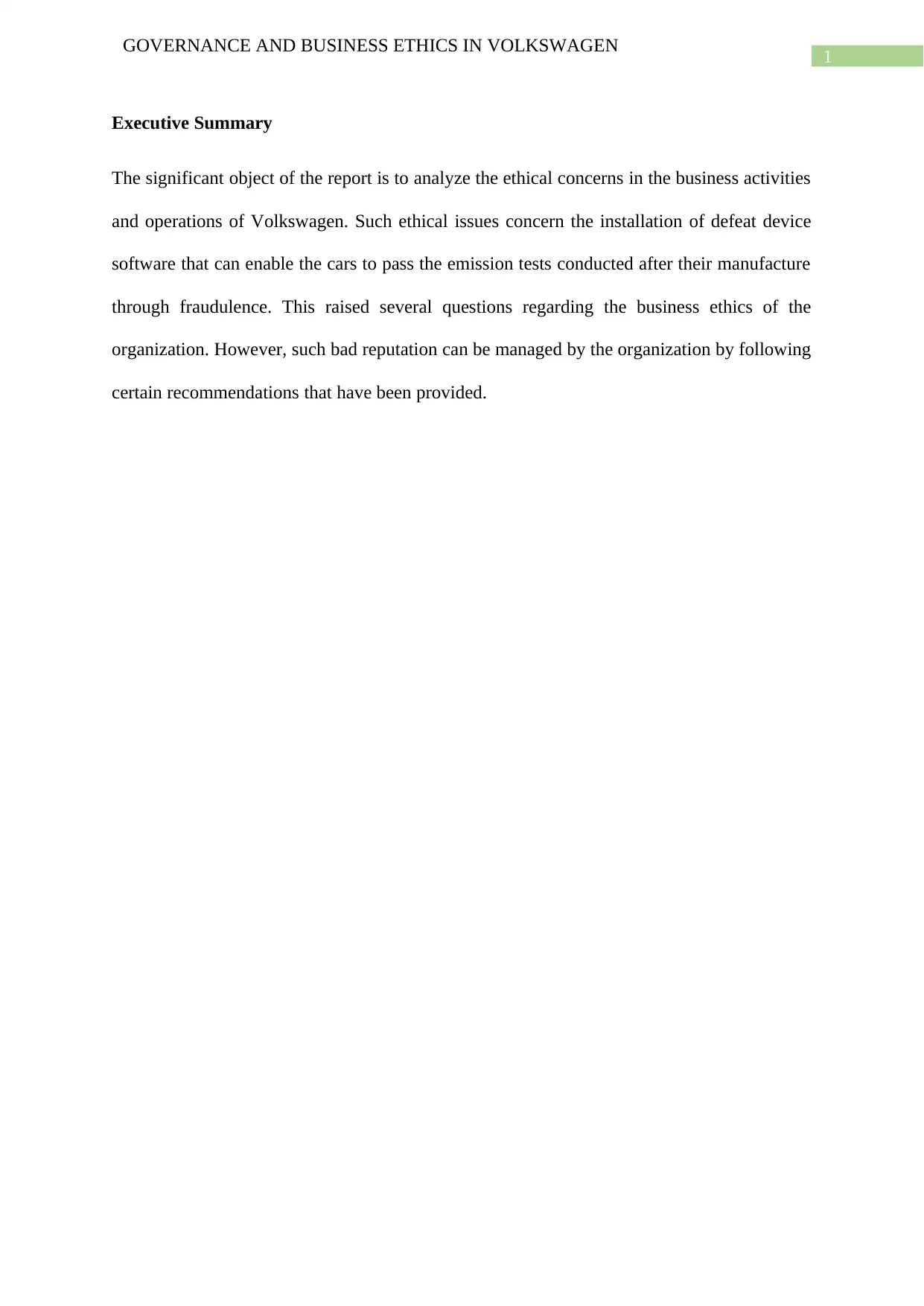
1
GOVERNANCE AND BUSINESS ETHICS IN VOLKSWAGEN
Executive Summary
The significant object of the report is to analyze the ethical concerns in the business activities
and operations of Volkswagen. Such ethical issues concern the installation of defeat device
software that can enable the cars to pass the emission tests conducted after their manufacture
through fraudulence. This raised several questions regarding the business ethics of the
organization. However, such bad reputation can be managed by the organization by following
certain recommendations that have been provided.
GOVERNANCE AND BUSINESS ETHICS IN VOLKSWAGEN
Executive Summary
The significant object of the report is to analyze the ethical concerns in the business activities
and operations of Volkswagen. Such ethical issues concern the installation of defeat device
software that can enable the cars to pass the emission tests conducted after their manufacture
through fraudulence. This raised several questions regarding the business ethics of the
organization. However, such bad reputation can be managed by the organization by following
certain recommendations that have been provided.
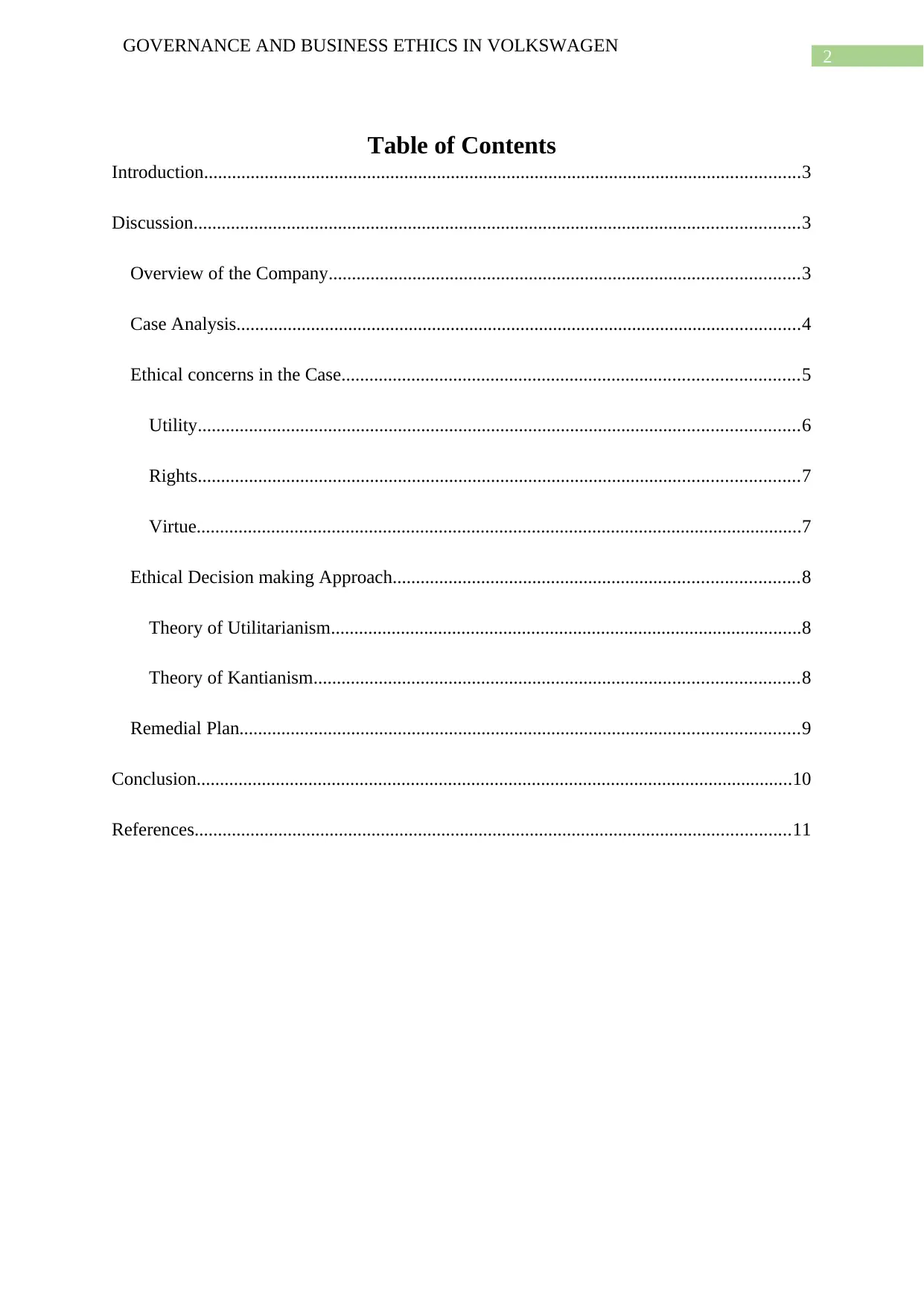
2
GOVERNANCE AND BUSINESS ETHICS IN VOLKSWAGEN
Table of Contents
Introduction................................................................................................................................3
Discussion..................................................................................................................................3
Overview of the Company.....................................................................................................3
Case Analysis.........................................................................................................................4
Ethical concerns in the Case..................................................................................................5
Utility.................................................................................................................................6
Rights.................................................................................................................................7
Virtue..................................................................................................................................7
Ethical Decision making Approach.......................................................................................8
Theory of Utilitarianism.....................................................................................................8
Theory of Kantianism........................................................................................................8
Remedial Plan........................................................................................................................9
Conclusion................................................................................................................................10
References................................................................................................................................11
GOVERNANCE AND BUSINESS ETHICS IN VOLKSWAGEN
Table of Contents
Introduction................................................................................................................................3
Discussion..................................................................................................................................3
Overview of the Company.....................................................................................................3
Case Analysis.........................................................................................................................4
Ethical concerns in the Case..................................................................................................5
Utility.................................................................................................................................6
Rights.................................................................................................................................7
Virtue..................................................................................................................................7
Ethical Decision making Approach.......................................................................................8
Theory of Utilitarianism.....................................................................................................8
Theory of Kantianism........................................................................................................8
Remedial Plan........................................................................................................................9
Conclusion................................................................................................................................10
References................................................................................................................................11
⊘ This is a preview!⊘
Do you want full access?
Subscribe today to unlock all pages.

Trusted by 1+ million students worldwide
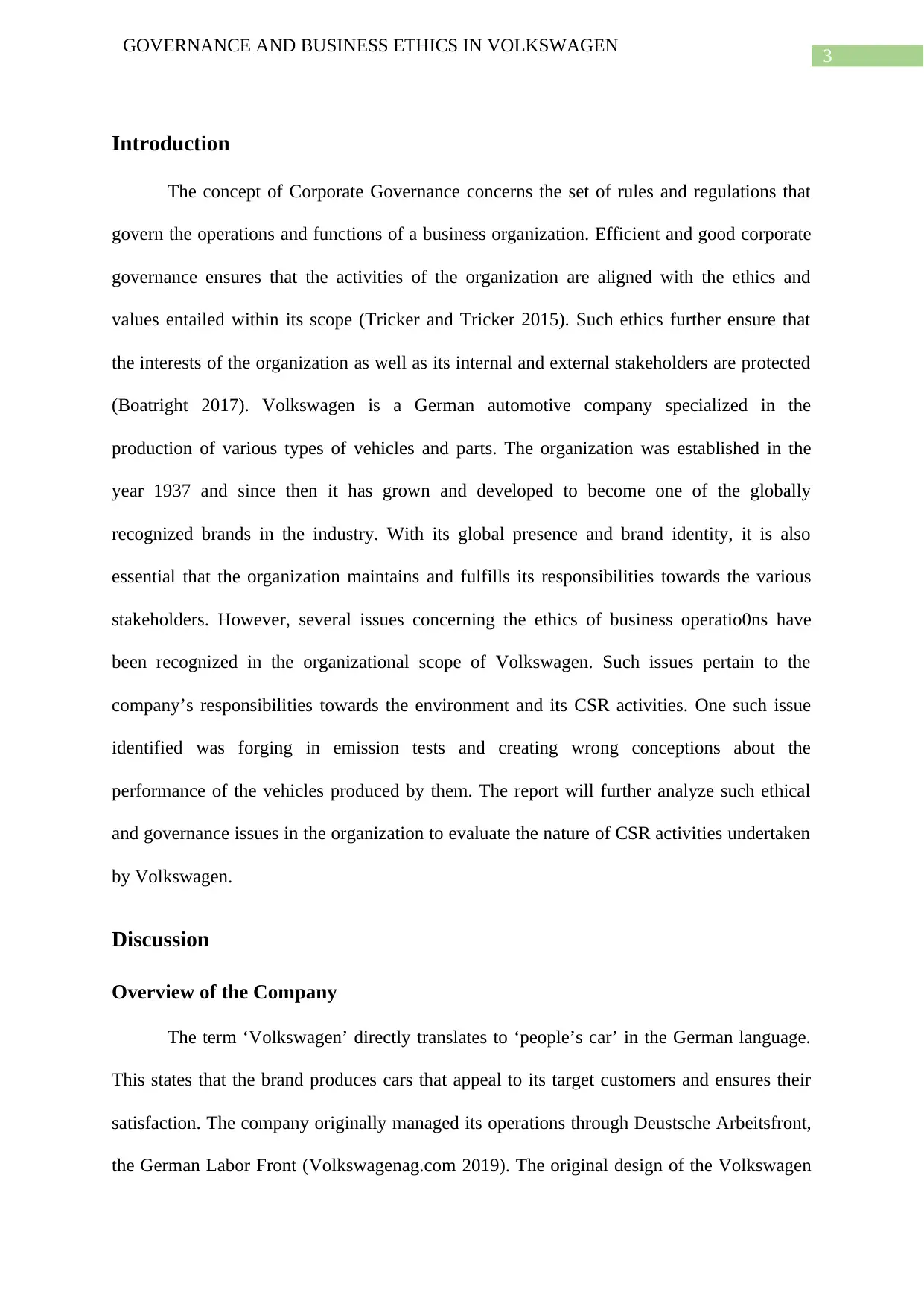
3
GOVERNANCE AND BUSINESS ETHICS IN VOLKSWAGEN
Introduction
The concept of Corporate Governance concerns the set of rules and regulations that
govern the operations and functions of a business organization. Efficient and good corporate
governance ensures that the activities of the organization are aligned with the ethics and
values entailed within its scope (Tricker and Tricker 2015). Such ethics further ensure that
the interests of the organization as well as its internal and external stakeholders are protected
(Boatright 2017). Volkswagen is a German automotive company specialized in the
production of various types of vehicles and parts. The organization was established in the
year 1937 and since then it has grown and developed to become one of the globally
recognized brands in the industry. With its global presence and brand identity, it is also
essential that the organization maintains and fulfills its responsibilities towards the various
stakeholders. However, several issues concerning the ethics of business operatio0ns have
been recognized in the organizational scope of Volkswagen. Such issues pertain to the
company’s responsibilities towards the environment and its CSR activities. One such issue
identified was forging in emission tests and creating wrong conceptions about the
performance of the vehicles produced by them. The report will further analyze such ethical
and governance issues in the organization to evaluate the nature of CSR activities undertaken
by Volkswagen.
Discussion
Overview of the Company
The term ‘Volkswagen’ directly translates to ‘people’s car’ in the German language.
This states that the brand produces cars that appeal to its target customers and ensures their
satisfaction. The company originally managed its operations through Deustsche Arbeitsfront,
the German Labor Front (Volkswagenag.com 2019). The original design of the Volkswagen
GOVERNANCE AND BUSINESS ETHICS IN VOLKSWAGEN
Introduction
The concept of Corporate Governance concerns the set of rules and regulations that
govern the operations and functions of a business organization. Efficient and good corporate
governance ensures that the activities of the organization are aligned with the ethics and
values entailed within its scope (Tricker and Tricker 2015). Such ethics further ensure that
the interests of the organization as well as its internal and external stakeholders are protected
(Boatright 2017). Volkswagen is a German automotive company specialized in the
production of various types of vehicles and parts. The organization was established in the
year 1937 and since then it has grown and developed to become one of the globally
recognized brands in the industry. With its global presence and brand identity, it is also
essential that the organization maintains and fulfills its responsibilities towards the various
stakeholders. However, several issues concerning the ethics of business operatio0ns have
been recognized in the organizational scope of Volkswagen. Such issues pertain to the
company’s responsibilities towards the environment and its CSR activities. One such issue
identified was forging in emission tests and creating wrong conceptions about the
performance of the vehicles produced by them. The report will further analyze such ethical
and governance issues in the organization to evaluate the nature of CSR activities undertaken
by Volkswagen.
Discussion
Overview of the Company
The term ‘Volkswagen’ directly translates to ‘people’s car’ in the German language.
This states that the brand produces cars that appeal to its target customers and ensures their
satisfaction. The company originally managed its operations through Deustsche Arbeitsfront,
the German Labor Front (Volkswagenag.com 2019). The original design of the Volkswagen
Paraphrase This Document
Need a fresh take? Get an instant paraphrase of this document with our AI Paraphraser
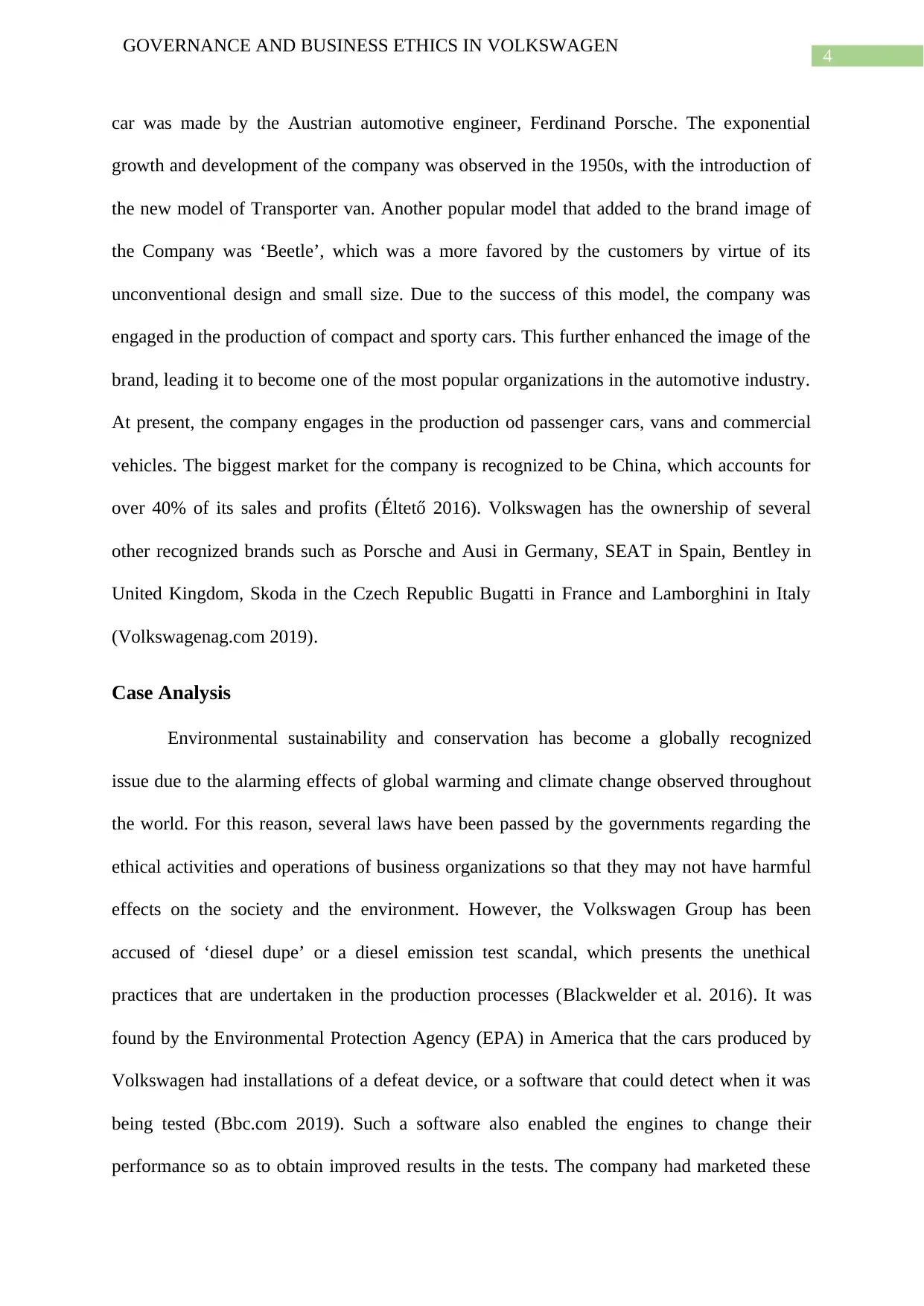
4
GOVERNANCE AND BUSINESS ETHICS IN VOLKSWAGEN
car was made by the Austrian automotive engineer, Ferdinand Porsche. The exponential
growth and development of the company was observed in the 1950s, with the introduction of
the new model of Transporter van. Another popular model that added to the brand image of
the Company was ‘Beetle’, which was a more favored by the customers by virtue of its
unconventional design and small size. Due to the success of this model, the company was
engaged in the production of compact and sporty cars. This further enhanced the image of the
brand, leading it to become one of the most popular organizations in the automotive industry.
At present, the company engages in the production od passenger cars, vans and commercial
vehicles. The biggest market for the company is recognized to be China, which accounts for
over 40% of its sales and profits (Éltető 2016). Volkswagen has the ownership of several
other recognized brands such as Porsche and Ausi in Germany, SEAT in Spain, Bentley in
United Kingdom, Skoda in the Czech Republic Bugatti in France and Lamborghini in Italy
(Volkswagenag.com 2019).
Case Analysis
Environmental sustainability and conservation has become a globally recognized
issue due to the alarming effects of global warming and climate change observed throughout
the world. For this reason, several laws have been passed by the governments regarding the
ethical activities and operations of business organizations so that they may not have harmful
effects on the society and the environment. However, the Volkswagen Group has been
accused of ‘diesel dupe’ or a diesel emission test scandal, which presents the unethical
practices that are undertaken in the production processes (Blackwelder et al. 2016). It was
found by the Environmental Protection Agency (EPA) in America that the cars produced by
Volkswagen had installations of a defeat device, or a software that could detect when it was
being tested (Bbc.com 2019). Such a software also enabled the engines to change their
performance so as to obtain improved results in the tests. The company had marketed these
GOVERNANCE AND BUSINESS ETHICS IN VOLKSWAGEN
car was made by the Austrian automotive engineer, Ferdinand Porsche. The exponential
growth and development of the company was observed in the 1950s, with the introduction of
the new model of Transporter van. Another popular model that added to the brand image of
the Company was ‘Beetle’, which was a more favored by the customers by virtue of its
unconventional design and small size. Due to the success of this model, the company was
engaged in the production of compact and sporty cars. This further enhanced the image of the
brand, leading it to become one of the most popular organizations in the automotive industry.
At present, the company engages in the production od passenger cars, vans and commercial
vehicles. The biggest market for the company is recognized to be China, which accounts for
over 40% of its sales and profits (Éltető 2016). Volkswagen has the ownership of several
other recognized brands such as Porsche and Ausi in Germany, SEAT in Spain, Bentley in
United Kingdom, Skoda in the Czech Republic Bugatti in France and Lamborghini in Italy
(Volkswagenag.com 2019).
Case Analysis
Environmental sustainability and conservation has become a globally recognized
issue due to the alarming effects of global warming and climate change observed throughout
the world. For this reason, several laws have been passed by the governments regarding the
ethical activities and operations of business organizations so that they may not have harmful
effects on the society and the environment. However, the Volkswagen Group has been
accused of ‘diesel dupe’ or a diesel emission test scandal, which presents the unethical
practices that are undertaken in the production processes (Blackwelder et al. 2016). It was
found by the Environmental Protection Agency (EPA) in America that the cars produced by
Volkswagen had installations of a defeat device, or a software that could detect when it was
being tested (Bbc.com 2019). Such a software also enabled the engines to change their
performance so as to obtain improved results in the tests. The company had marketed these
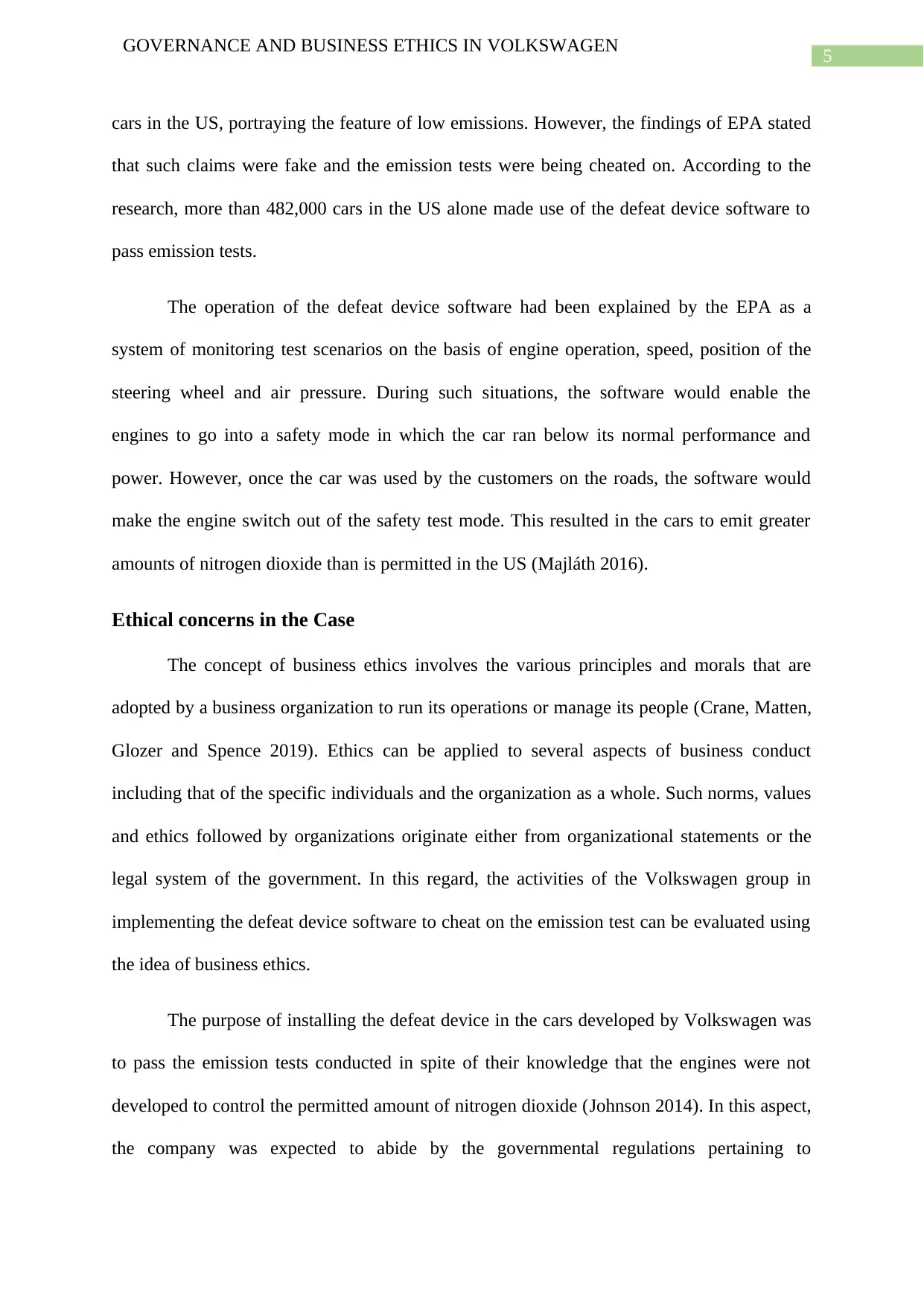
5
GOVERNANCE AND BUSINESS ETHICS IN VOLKSWAGEN
cars in the US, portraying the feature of low emissions. However, the findings of EPA stated
that such claims were fake and the emission tests were being cheated on. According to the
research, more than 482,000 cars in the US alone made use of the defeat device software to
pass emission tests.
The operation of the defeat device software had been explained by the EPA as a
system of monitoring test scenarios on the basis of engine operation, speed, position of the
steering wheel and air pressure. During such situations, the software would enable the
engines to go into a safety mode in which the car ran below its normal performance and
power. However, once the car was used by the customers on the roads, the software would
make the engine switch out of the safety test mode. This resulted in the cars to emit greater
amounts of nitrogen dioxide than is permitted in the US (Majláth 2016).
Ethical concerns in the Case
The concept of business ethics involves the various principles and morals that are
adopted by a business organization to run its operations or manage its people (Crane, Matten,
Glozer and Spence 2019). Ethics can be applied to several aspects of business conduct
including that of the specific individuals and the organization as a whole. Such norms, values
and ethics followed by organizations originate either from organizational statements or the
legal system of the government. In this regard, the activities of the Volkswagen group in
implementing the defeat device software to cheat on the emission test can be evaluated using
the idea of business ethics.
The purpose of installing the defeat device in the cars developed by Volkswagen was
to pass the emission tests conducted in spite of their knowledge that the engines were not
developed to control the permitted amount of nitrogen dioxide (Johnson 2014). In this aspect,
the company was expected to abide by the governmental regulations pertaining to
GOVERNANCE AND BUSINESS ETHICS IN VOLKSWAGEN
cars in the US, portraying the feature of low emissions. However, the findings of EPA stated
that such claims were fake and the emission tests were being cheated on. According to the
research, more than 482,000 cars in the US alone made use of the defeat device software to
pass emission tests.
The operation of the defeat device software had been explained by the EPA as a
system of monitoring test scenarios on the basis of engine operation, speed, position of the
steering wheel and air pressure. During such situations, the software would enable the
engines to go into a safety mode in which the car ran below its normal performance and
power. However, once the car was used by the customers on the roads, the software would
make the engine switch out of the safety test mode. This resulted in the cars to emit greater
amounts of nitrogen dioxide than is permitted in the US (Majláth 2016).
Ethical concerns in the Case
The concept of business ethics involves the various principles and morals that are
adopted by a business organization to run its operations or manage its people (Crane, Matten,
Glozer and Spence 2019). Ethics can be applied to several aspects of business conduct
including that of the specific individuals and the organization as a whole. Such norms, values
and ethics followed by organizations originate either from organizational statements or the
legal system of the government. In this regard, the activities of the Volkswagen group in
implementing the defeat device software to cheat on the emission test can be evaluated using
the idea of business ethics.
The purpose of installing the defeat device in the cars developed by Volkswagen was
to pass the emission tests conducted in spite of their knowledge that the engines were not
developed to control the permitted amount of nitrogen dioxide (Johnson 2014). In this aspect,
the company was expected to abide by the governmental regulations pertaining to
⊘ This is a preview!⊘
Do you want full access?
Subscribe today to unlock all pages.

Trusted by 1+ million students worldwide
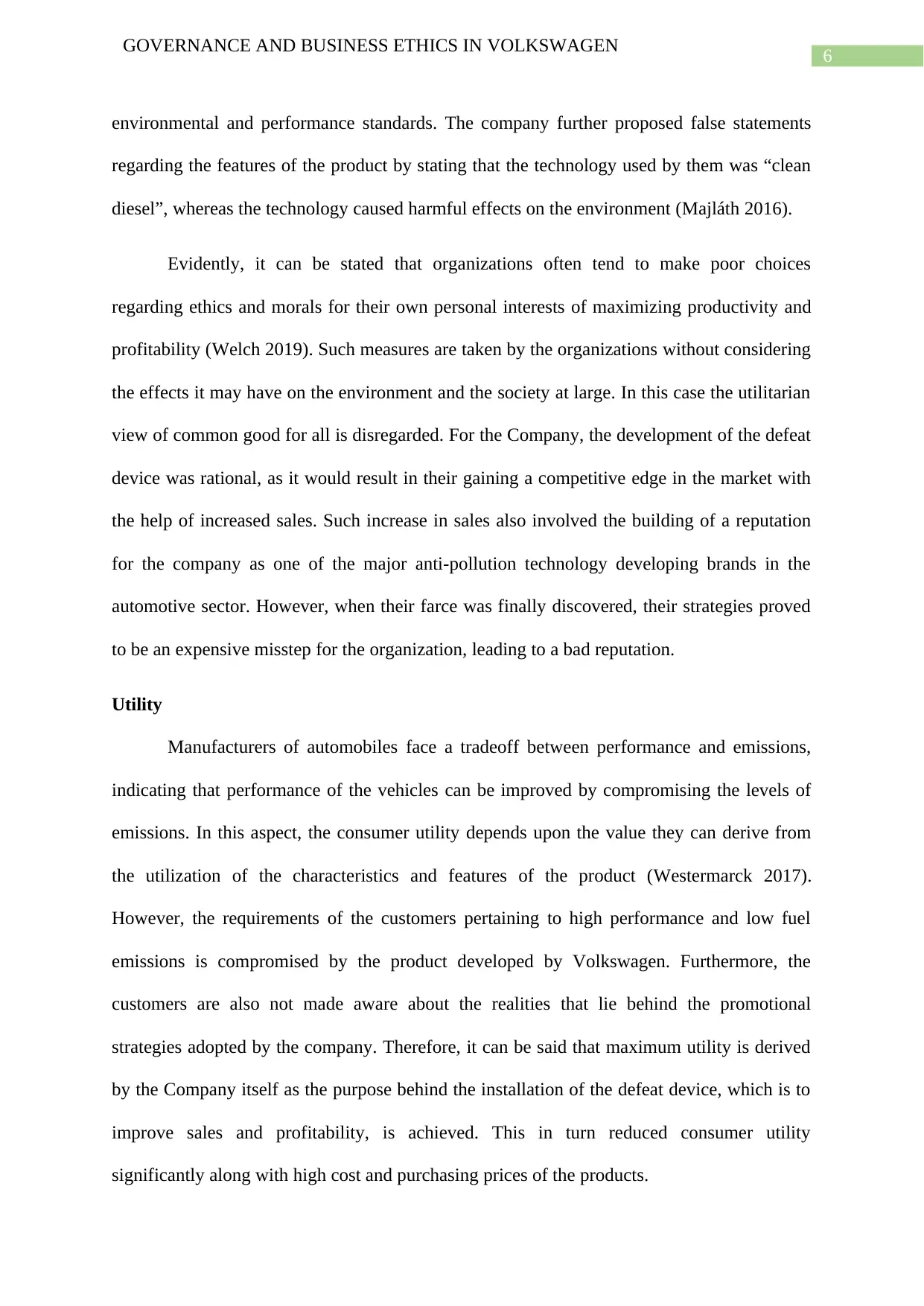
6
GOVERNANCE AND BUSINESS ETHICS IN VOLKSWAGEN
environmental and performance standards. The company further proposed false statements
regarding the features of the product by stating that the technology used by them was “clean
diesel”, whereas the technology caused harmful effects on the environment (Majláth 2016).
Evidently, it can be stated that organizations often tend to make poor choices
regarding ethics and morals for their own personal interests of maximizing productivity and
profitability (Welch 2019). Such measures are taken by the organizations without considering
the effects it may have on the environment and the society at large. In this case the utilitarian
view of common good for all is disregarded. For the Company, the development of the defeat
device was rational, as it would result in their gaining a competitive edge in the market with
the help of increased sales. Such increase in sales also involved the building of a reputation
for the company as one of the major anti-pollution technology developing brands in the
automotive sector. However, when their farce was finally discovered, their strategies proved
to be an expensive misstep for the organization, leading to a bad reputation.
Utility
Manufacturers of automobiles face a tradeoff between performance and emissions,
indicating that performance of the vehicles can be improved by compromising the levels of
emissions. In this aspect, the consumer utility depends upon the value they can derive from
the utilization of the characteristics and features of the product (Westermarck 2017).
However, the requirements of the customers pertaining to high performance and low fuel
emissions is compromised by the product developed by Volkswagen. Furthermore, the
customers are also not made aware about the realities that lie behind the promotional
strategies adopted by the company. Therefore, it can be said that maximum utility is derived
by the Company itself as the purpose behind the installation of the defeat device, which is to
improve sales and profitability, is achieved. This in turn reduced consumer utility
significantly along with high cost and purchasing prices of the products.
GOVERNANCE AND BUSINESS ETHICS IN VOLKSWAGEN
environmental and performance standards. The company further proposed false statements
regarding the features of the product by stating that the technology used by them was “clean
diesel”, whereas the technology caused harmful effects on the environment (Majláth 2016).
Evidently, it can be stated that organizations often tend to make poor choices
regarding ethics and morals for their own personal interests of maximizing productivity and
profitability (Welch 2019). Such measures are taken by the organizations without considering
the effects it may have on the environment and the society at large. In this case the utilitarian
view of common good for all is disregarded. For the Company, the development of the defeat
device was rational, as it would result in their gaining a competitive edge in the market with
the help of increased sales. Such increase in sales also involved the building of a reputation
for the company as one of the major anti-pollution technology developing brands in the
automotive sector. However, when their farce was finally discovered, their strategies proved
to be an expensive misstep for the organization, leading to a bad reputation.
Utility
Manufacturers of automobiles face a tradeoff between performance and emissions,
indicating that performance of the vehicles can be improved by compromising the levels of
emissions. In this aspect, the consumer utility depends upon the value they can derive from
the utilization of the characteristics and features of the product (Westermarck 2017).
However, the requirements of the customers pertaining to high performance and low fuel
emissions is compromised by the product developed by Volkswagen. Furthermore, the
customers are also not made aware about the realities that lie behind the promotional
strategies adopted by the company. Therefore, it can be said that maximum utility is derived
by the Company itself as the purpose behind the installation of the defeat device, which is to
improve sales and profitability, is achieved. This in turn reduced consumer utility
significantly along with high cost and purchasing prices of the products.
Paraphrase This Document
Need a fresh take? Get an instant paraphrase of this document with our AI Paraphraser
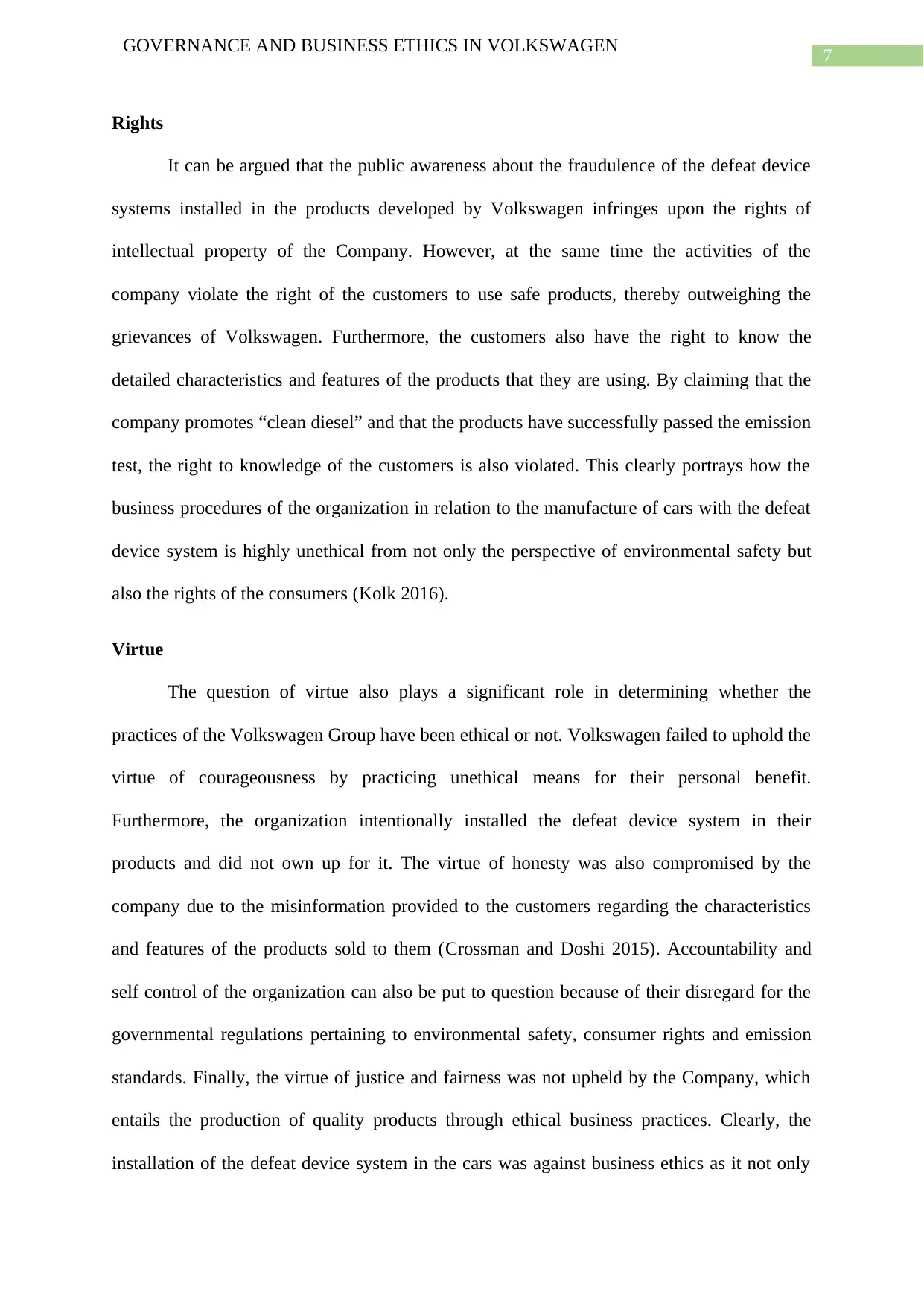
7
GOVERNANCE AND BUSINESS ETHICS IN VOLKSWAGEN
Rights
It can be argued that the public awareness about the fraudulence of the defeat device
systems installed in the products developed by Volkswagen infringes upon the rights of
intellectual property of the Company. However, at the same time the activities of the
company violate the right of the customers to use safe products, thereby outweighing the
grievances of Volkswagen. Furthermore, the customers also have the right to know the
detailed characteristics and features of the products that they are using. By claiming that the
company promotes “clean diesel” and that the products have successfully passed the emission
test, the right to knowledge of the customers is also violated. This clearly portrays how the
business procedures of the organization in relation to the manufacture of cars with the defeat
device system is highly unethical from not only the perspective of environmental safety but
also the rights of the consumers (Kolk 2016).
Virtue
The question of virtue also plays a significant role in determining whether the
practices of the Volkswagen Group have been ethical or not. Volkswagen failed to uphold the
virtue of courageousness by practicing unethical means for their personal benefit.
Furthermore, the organization intentionally installed the defeat device system in their
products and did not own up for it. The virtue of honesty was also compromised by the
company due to the misinformation provided to the customers regarding the characteristics
and features of the products sold to them (Crossman and Doshi 2015). Accountability and
self control of the organization can also be put to question because of their disregard for the
governmental regulations pertaining to environmental safety, consumer rights and emission
standards. Finally, the virtue of justice and fairness was not upheld by the Company, which
entails the production of quality products through ethical business practices. Clearly, the
installation of the defeat device system in the cars was against business ethics as it not only
GOVERNANCE AND BUSINESS ETHICS IN VOLKSWAGEN
Rights
It can be argued that the public awareness about the fraudulence of the defeat device
systems installed in the products developed by Volkswagen infringes upon the rights of
intellectual property of the Company. However, at the same time the activities of the
company violate the right of the customers to use safe products, thereby outweighing the
grievances of Volkswagen. Furthermore, the customers also have the right to know the
detailed characteristics and features of the products that they are using. By claiming that the
company promotes “clean diesel” and that the products have successfully passed the emission
test, the right to knowledge of the customers is also violated. This clearly portrays how the
business procedures of the organization in relation to the manufacture of cars with the defeat
device system is highly unethical from not only the perspective of environmental safety but
also the rights of the consumers (Kolk 2016).
Virtue
The question of virtue also plays a significant role in determining whether the
practices of the Volkswagen Group have been ethical or not. Volkswagen failed to uphold the
virtue of courageousness by practicing unethical means for their personal benefit.
Furthermore, the organization intentionally installed the defeat device system in their
products and did not own up for it. The virtue of honesty was also compromised by the
company due to the misinformation provided to the customers regarding the characteristics
and features of the products sold to them (Crossman and Doshi 2015). Accountability and
self control of the organization can also be put to question because of their disregard for the
governmental regulations pertaining to environmental safety, consumer rights and emission
standards. Finally, the virtue of justice and fairness was not upheld by the Company, which
entails the production of quality products through ethical business practices. Clearly, the
installation of the defeat device system in the cars was against business ethics as it not only
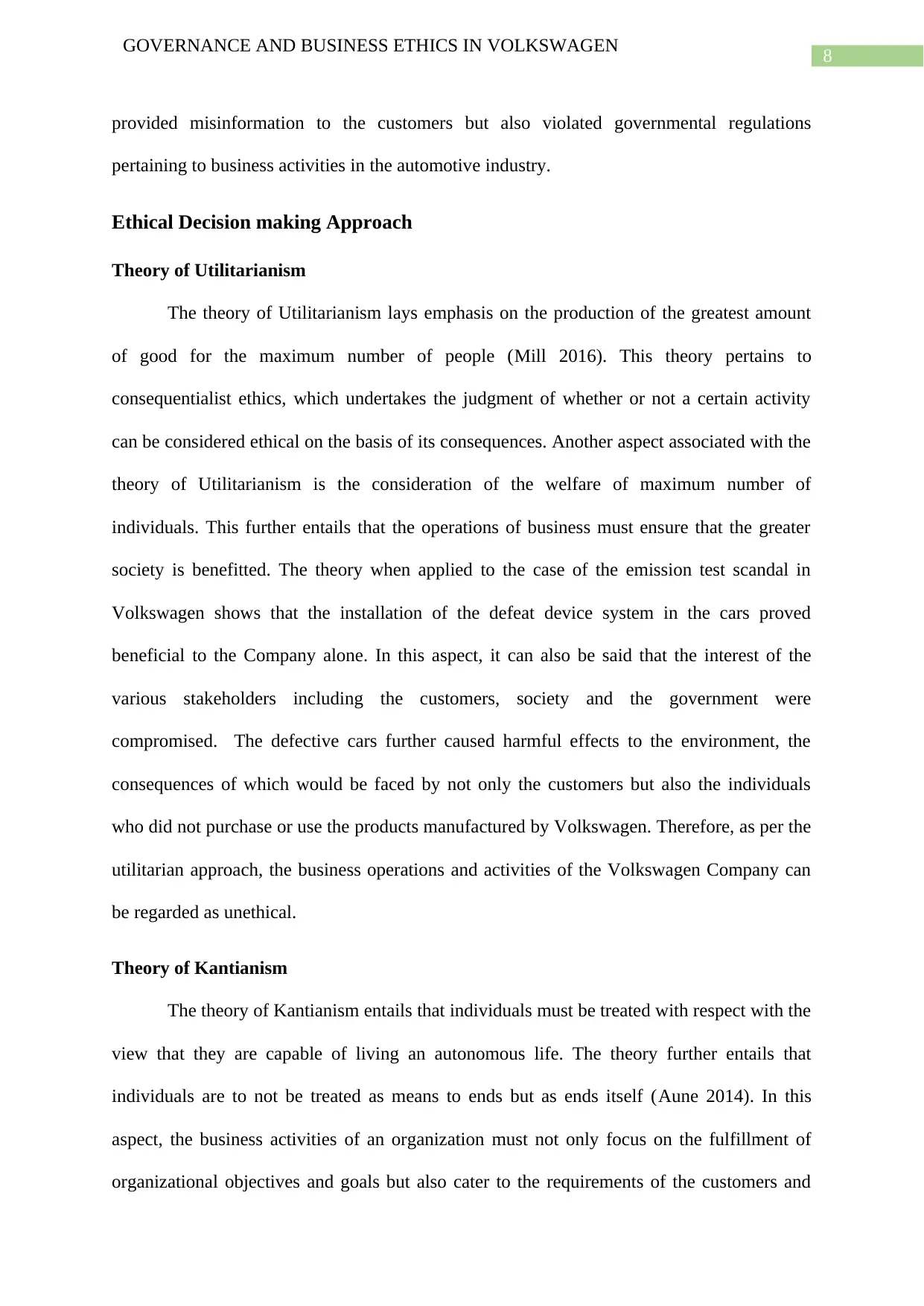
8
GOVERNANCE AND BUSINESS ETHICS IN VOLKSWAGEN
provided misinformation to the customers but also violated governmental regulations
pertaining to business activities in the automotive industry.
Ethical Decision making Approach
Theory of Utilitarianism
The theory of Utilitarianism lays emphasis on the production of the greatest amount
of good for the maximum number of people (Mill 2016). This theory pertains to
consequentialist ethics, which undertakes the judgment of whether or not a certain activity
can be considered ethical on the basis of its consequences. Another aspect associated with the
theory of Utilitarianism is the consideration of the welfare of maximum number of
individuals. This further entails that the operations of business must ensure that the greater
society is benefitted. The theory when applied to the case of the emission test scandal in
Volkswagen shows that the installation of the defeat device system in the cars proved
beneficial to the Company alone. In this aspect, it can also be said that the interest of the
various stakeholders including the customers, society and the government were
compromised. The defective cars further caused harmful effects to the environment, the
consequences of which would be faced by not only the customers but also the individuals
who did not purchase or use the products manufactured by Volkswagen. Therefore, as per the
utilitarian approach, the business operations and activities of the Volkswagen Company can
be regarded as unethical.
Theory of Kantianism
The theory of Kantianism entails that individuals must be treated with respect with the
view that they are capable of living an autonomous life. The theory further entails that
individuals are to not be treated as means to ends but as ends itself (Aune 2014). In this
aspect, the business activities of an organization must not only focus on the fulfillment of
organizational objectives and goals but also cater to the requirements of the customers and
GOVERNANCE AND BUSINESS ETHICS IN VOLKSWAGEN
provided misinformation to the customers but also violated governmental regulations
pertaining to business activities in the automotive industry.
Ethical Decision making Approach
Theory of Utilitarianism
The theory of Utilitarianism lays emphasis on the production of the greatest amount
of good for the maximum number of people (Mill 2016). This theory pertains to
consequentialist ethics, which undertakes the judgment of whether or not a certain activity
can be considered ethical on the basis of its consequences. Another aspect associated with the
theory of Utilitarianism is the consideration of the welfare of maximum number of
individuals. This further entails that the operations of business must ensure that the greater
society is benefitted. The theory when applied to the case of the emission test scandal in
Volkswagen shows that the installation of the defeat device system in the cars proved
beneficial to the Company alone. In this aspect, it can also be said that the interest of the
various stakeholders including the customers, society and the government were
compromised. The defective cars further caused harmful effects to the environment, the
consequences of which would be faced by not only the customers but also the individuals
who did not purchase or use the products manufactured by Volkswagen. Therefore, as per the
utilitarian approach, the business operations and activities of the Volkswagen Company can
be regarded as unethical.
Theory of Kantianism
The theory of Kantianism entails that individuals must be treated with respect with the
view that they are capable of living an autonomous life. The theory further entails that
individuals are to not be treated as means to ends but as ends itself (Aune 2014). In this
aspect, the business activities of an organization must not only focus on the fulfillment of
organizational objectives and goals but also cater to the requirements of the customers and
⊘ This is a preview!⊘
Do you want full access?
Subscribe today to unlock all pages.

Trusted by 1+ million students worldwide
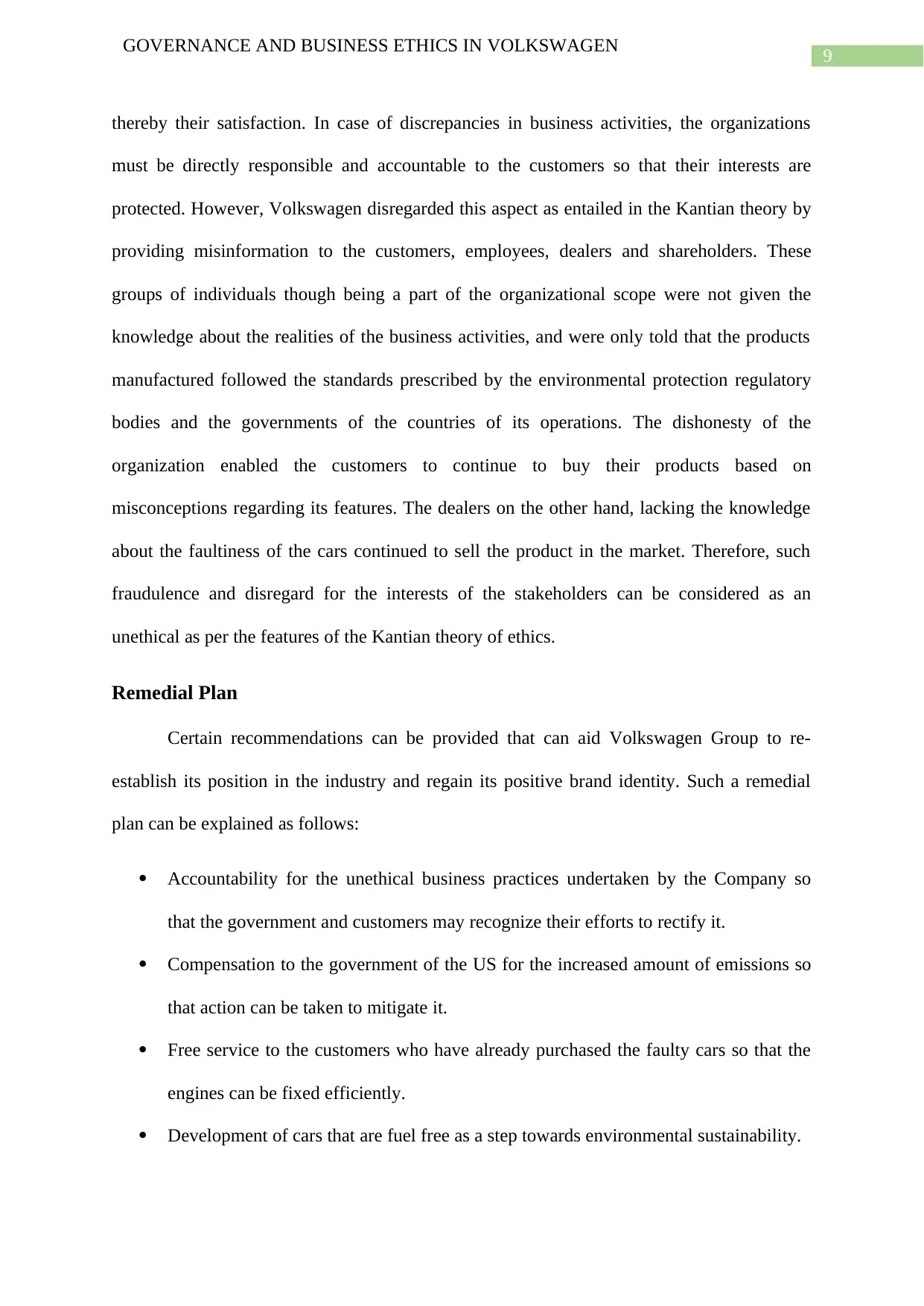
9
GOVERNANCE AND BUSINESS ETHICS IN VOLKSWAGEN
thereby their satisfaction. In case of discrepancies in business activities, the organizations
must be directly responsible and accountable to the customers so that their interests are
protected. However, Volkswagen disregarded this aspect as entailed in the Kantian theory by
providing misinformation to the customers, employees, dealers and shareholders. These
groups of individuals though being a part of the organizational scope were not given the
knowledge about the realities of the business activities, and were only told that the products
manufactured followed the standards prescribed by the environmental protection regulatory
bodies and the governments of the countries of its operations. The dishonesty of the
organization enabled the customers to continue to buy their products based on
misconceptions regarding its features. The dealers on the other hand, lacking the knowledge
about the faultiness of the cars continued to sell the product in the market. Therefore, such
fraudulence and disregard for the interests of the stakeholders can be considered as an
unethical as per the features of the Kantian theory of ethics.
Remedial Plan
Certain recommendations can be provided that can aid Volkswagen Group to re-
establish its position in the industry and regain its positive brand identity. Such a remedial
plan can be explained as follows:
Accountability for the unethical business practices undertaken by the Company so
that the government and customers may recognize their efforts to rectify it.
Compensation to the government of the US for the increased amount of emissions so
that action can be taken to mitigate it.
Free service to the customers who have already purchased the faulty cars so that the
engines can be fixed efficiently.
Development of cars that are fuel free as a step towards environmental sustainability.
GOVERNANCE AND BUSINESS ETHICS IN VOLKSWAGEN
thereby their satisfaction. In case of discrepancies in business activities, the organizations
must be directly responsible and accountable to the customers so that their interests are
protected. However, Volkswagen disregarded this aspect as entailed in the Kantian theory by
providing misinformation to the customers, employees, dealers and shareholders. These
groups of individuals though being a part of the organizational scope were not given the
knowledge about the realities of the business activities, and were only told that the products
manufactured followed the standards prescribed by the environmental protection regulatory
bodies and the governments of the countries of its operations. The dishonesty of the
organization enabled the customers to continue to buy their products based on
misconceptions regarding its features. The dealers on the other hand, lacking the knowledge
about the faultiness of the cars continued to sell the product in the market. Therefore, such
fraudulence and disregard for the interests of the stakeholders can be considered as an
unethical as per the features of the Kantian theory of ethics.
Remedial Plan
Certain recommendations can be provided that can aid Volkswagen Group to re-
establish its position in the industry and regain its positive brand identity. Such a remedial
plan can be explained as follows:
Accountability for the unethical business practices undertaken by the Company so
that the government and customers may recognize their efforts to rectify it.
Compensation to the government of the US for the increased amount of emissions so
that action can be taken to mitigate it.
Free service to the customers who have already purchased the faulty cars so that the
engines can be fixed efficiently.
Development of cars that are fuel free as a step towards environmental sustainability.
Paraphrase This Document
Need a fresh take? Get an instant paraphrase of this document with our AI Paraphraser
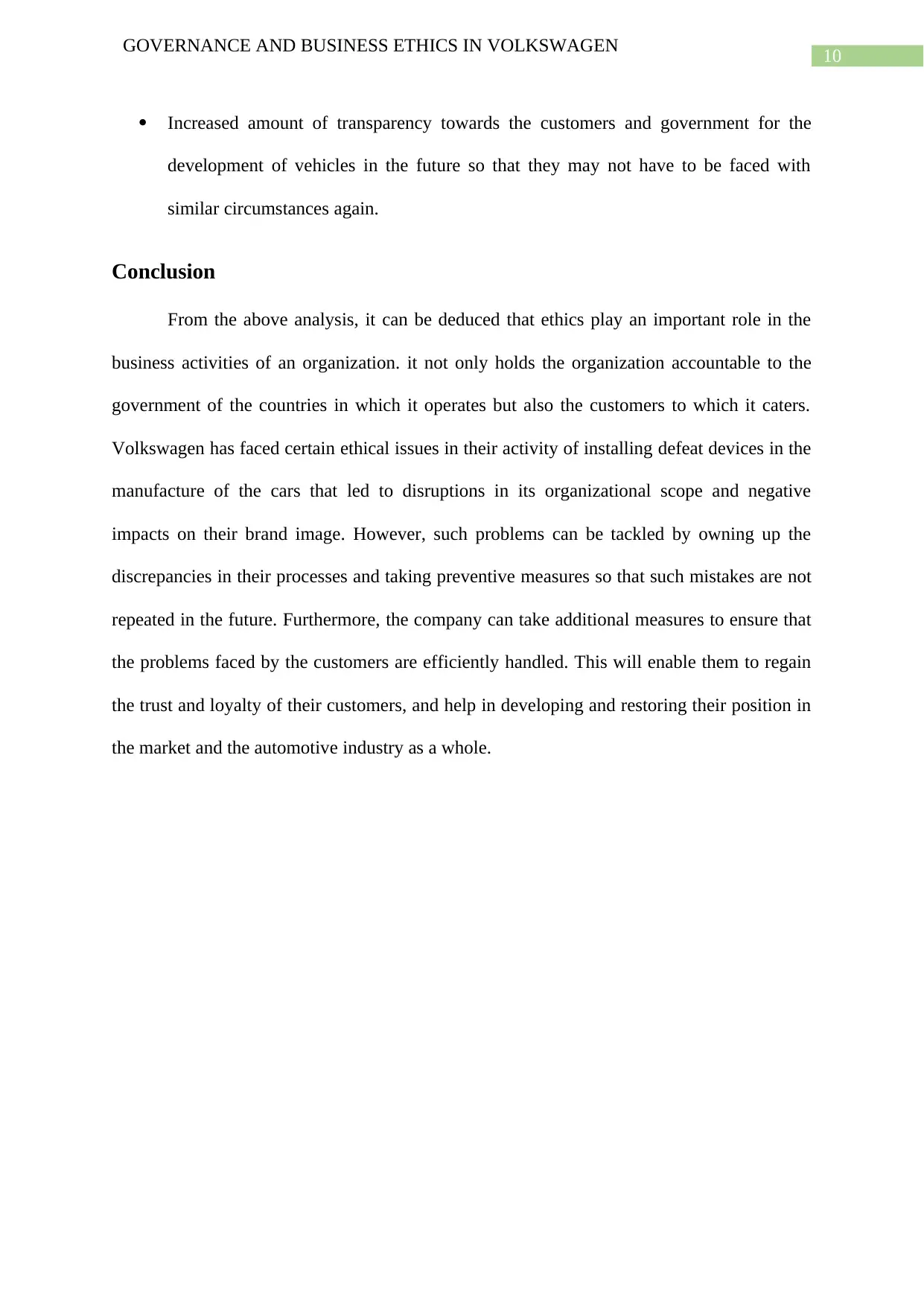
10
GOVERNANCE AND BUSINESS ETHICS IN VOLKSWAGEN
Increased amount of transparency towards the customers and government for the
development of vehicles in the future so that they may not have to be faced with
similar circumstances again.
Conclusion
From the above analysis, it can be deduced that ethics play an important role in the
business activities of an organization. it not only holds the organization accountable to the
government of the countries in which it operates but also the customers to which it caters.
Volkswagen has faced certain ethical issues in their activity of installing defeat devices in the
manufacture of the cars that led to disruptions in its organizational scope and negative
impacts on their brand image. However, such problems can be tackled by owning up the
discrepancies in their processes and taking preventive measures so that such mistakes are not
repeated in the future. Furthermore, the company can take additional measures to ensure that
the problems faced by the customers are efficiently handled. This will enable them to regain
the trust and loyalty of their customers, and help in developing and restoring their position in
the market and the automotive industry as a whole.
GOVERNANCE AND BUSINESS ETHICS IN VOLKSWAGEN
Increased amount of transparency towards the customers and government for the
development of vehicles in the future so that they may not have to be faced with
similar circumstances again.
Conclusion
From the above analysis, it can be deduced that ethics play an important role in the
business activities of an organization. it not only holds the organization accountable to the
government of the countries in which it operates but also the customers to which it caters.
Volkswagen has faced certain ethical issues in their activity of installing defeat devices in the
manufacture of the cars that led to disruptions in its organizational scope and negative
impacts on their brand image. However, such problems can be tackled by owning up the
discrepancies in their processes and taking preventive measures so that such mistakes are not
repeated in the future. Furthermore, the company can take additional measures to ensure that
the problems faced by the customers are efficiently handled. This will enable them to regain
the trust and loyalty of their customers, and help in developing and restoring their position in
the market and the automotive industry as a whole.
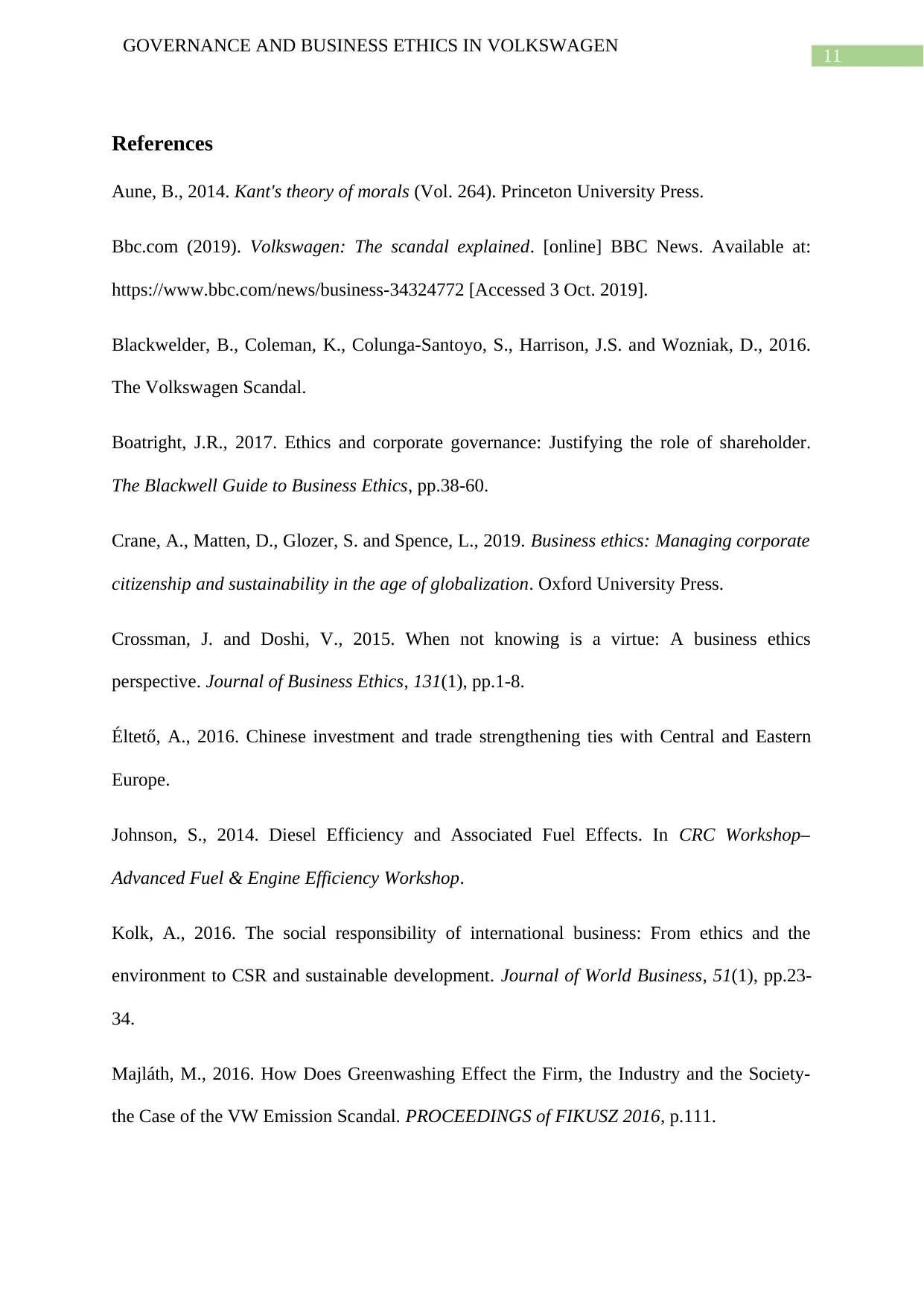
11
GOVERNANCE AND BUSINESS ETHICS IN VOLKSWAGEN
References
Aune, B., 2014. Kant's theory of morals (Vol. 264). Princeton University Press.
Bbc.com (2019). Volkswagen: The scandal explained. [online] BBC News. Available at:
https://www.bbc.com/news/business-34324772 [Accessed 3 Oct. 2019].
Blackwelder, B., Coleman, K., Colunga-Santoyo, S., Harrison, J.S. and Wozniak, D., 2016.
The Volkswagen Scandal.
Boatright, J.R., 2017. Ethics and corporate governance: Justifying the role of shareholder.
The Blackwell Guide to Business Ethics, pp.38-60.
Crane, A., Matten, D., Glozer, S. and Spence, L., 2019. Business ethics: Managing corporate
citizenship and sustainability in the age of globalization. Oxford University Press.
Crossman, J. and Doshi, V., 2015. When not knowing is a virtue: A business ethics
perspective. Journal of Business Ethics, 131(1), pp.1-8.
Éltető, A., 2016. Chinese investment and trade strengthening ties with Central and Eastern
Europe.
Johnson, S., 2014. Diesel Efficiency and Associated Fuel Effects. In CRC Workshop–
Advanced Fuel & Engine Efficiency Workshop.
Kolk, A., 2016. The social responsibility of international business: From ethics and the
environment to CSR and sustainable development. Journal of World Business, 51(1), pp.23-
34.
Majláth, M., 2016. How Does Greenwashing Effect the Firm, the Industry and the Society-
the Case of the VW Emission Scandal. PROCEEDINGS of FIKUSZ 2016, p.111.
GOVERNANCE AND BUSINESS ETHICS IN VOLKSWAGEN
References
Aune, B., 2014. Kant's theory of morals (Vol. 264). Princeton University Press.
Bbc.com (2019). Volkswagen: The scandal explained. [online] BBC News. Available at:
https://www.bbc.com/news/business-34324772 [Accessed 3 Oct. 2019].
Blackwelder, B., Coleman, K., Colunga-Santoyo, S., Harrison, J.S. and Wozniak, D., 2016.
The Volkswagen Scandal.
Boatright, J.R., 2017. Ethics and corporate governance: Justifying the role of shareholder.
The Blackwell Guide to Business Ethics, pp.38-60.
Crane, A., Matten, D., Glozer, S. and Spence, L., 2019. Business ethics: Managing corporate
citizenship and sustainability in the age of globalization. Oxford University Press.
Crossman, J. and Doshi, V., 2015. When not knowing is a virtue: A business ethics
perspective. Journal of Business Ethics, 131(1), pp.1-8.
Éltető, A., 2016. Chinese investment and trade strengthening ties with Central and Eastern
Europe.
Johnson, S., 2014. Diesel Efficiency and Associated Fuel Effects. In CRC Workshop–
Advanced Fuel & Engine Efficiency Workshop.
Kolk, A., 2016. The social responsibility of international business: From ethics and the
environment to CSR and sustainable development. Journal of World Business, 51(1), pp.23-
34.
Majláth, M., 2016. How Does Greenwashing Effect the Firm, the Industry and the Society-
the Case of the VW Emission Scandal. PROCEEDINGS of FIKUSZ 2016, p.111.
⊘ This is a preview!⊘
Do you want full access?
Subscribe today to unlock all pages.

Trusted by 1+ million students worldwide
1 out of 13
Related Documents
Your All-in-One AI-Powered Toolkit for Academic Success.
+13062052269
info@desklib.com
Available 24*7 on WhatsApp / Email
![[object Object]](/_next/static/media/star-bottom.7253800d.svg)
Unlock your academic potential
Copyright © 2020–2026 A2Z Services. All Rights Reserved. Developed and managed by ZUCOL.





